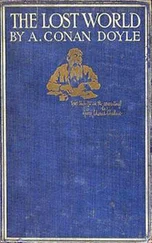Arthur Conan Doyle - The Refugees
Здесь есть возможность читать онлайн «Arthur Conan Doyle - The Refugees» весь текст электронной книги совершенно бесплатно (целиком полную версию без сокращений). В некоторых случаях можно слушать аудио, скачать через торрент в формате fb2 и присутствует краткое содержание. Издательство: Array Иностранный паблик, Жанр: foreign_prose, на английском языке. Описание произведения, (предисловие) а так же отзывы посетителей доступны на портале библиотеки ЛибКат.
- Название:The Refugees
- Автор:
- Издательство:Array Иностранный паблик
- Жанр:
- Год:неизвестен
- ISBN:нет данных
- Рейтинг книги:3 / 5. Голосов: 1
-
Избранное:Добавить в избранное
- Отзывы:
-
Ваша оценка:
- 60
- 1
- 2
- 3
- 4
- 5
The Refugees: краткое содержание, описание и аннотация
Предлагаем к чтению аннотацию, описание, краткое содержание или предисловие (зависит от того, что написал сам автор книги «The Refugees»). Если вы не нашли необходимую информацию о книге — напишите в комментариях, мы постараемся отыскать её.
The Refugees — читать онлайн бесплатно полную книгу (весь текст) целиком
Ниже представлен текст книги, разбитый по страницам. Система сохранения места последней прочитанной страницы, позволяет с удобством читать онлайн бесплатно книгу «The Refugees», без необходимости каждый раз заново искать на чём Вы остановились. Поставьте закладку, и сможете в любой момент перейти на страницу, на которой закончили чтение.
Интервал:
Закладка:
"Ah, if I but knew their snip-snap, lippetty-chippetty lingo! Saw one ever such a sight! Amos, lad, what is the French for 'a shameless hussy'?"
"Nay, nay, Ephraim. Surely one may see such a sight, and think no harm of it, on our side of the water.
"Never, Amos. In no godly country."
"Tut! I have seen folks courting in New York."
"Ah, New York! I said in no godly country. I cannot answer for New York or Virginia. South of Cape Cod, or of New Haven at the furthest, there is no saying what folk will do. Very sure I am that in Boston or Salem or Plymouth she would see the bridewell and he the stocks for half as much. Ah!" He shook his head and bent his brows at the guilty couple.
But they and their old relative were far too engrossed with their own affairs to give a thought to the Puritan seaman. De Catinat had told his tale in a few short, bitter sentences, the injustice that had been done to him, his dismissal from the king's service, and the ruin which had come upon the Huguenots of France. Adele, as is the angel instinct of woman, thought only of her lover and his misfortunes as she listened to his story, but the old merchant tottered to his feet when he heard of the revocation of the Edict, and stood with shaking limbs, staring about him in bewilderment.
"What am I to do?" he cried. "What am I to do? I am too old to begin my life again."
"Never fear, uncle," said De Catinat heartily. "There are other lands beyond France."
"But not for me. No, no; I am too old. Lord, but Thy hand is heavy upon Thy servants. Now is the vial opened, and the carved work of the sanctuary thrown down. Ah, what shall I do, and whither shall I turn?" He wrung his hands in his perplexity.
"What is amiss with him, then, Amos?" asked the seaman. "Though I know nothing of what he says, yet I can see that he flies a distress signal."
"He and his must leave the country, Ephraim."
"And why?"
"Because they are Protestants, and the king will not abide their creed."
Ephraim Savage was across the room in an instant, and had enclosed the old merchant's thin hand in his own great knotted fist. There was a brotherly sympathy in his strong grip and rugged weather-stained face which held up the other's courage as no words could have done.
"What is the French for 'the scarlet woman,' Amos?" he asked, glancing over his shoulder. "Tell this man that we shall see him through. Tell him that we've got a country where he'll just fit in like a bung in a barrel. Tell him that religion is free to all there, and not a papist nearer than Baltimore or the Capuchins of the Penobscot. Tell him that if he wants to come, the Golden Rod is waiting with her anchor apeak and her cargo aboard. Tell him what you like, so long as you make him come."
"Then we must come at once," said De Catinat, as he listened to the cordial message which was conveyed to his uncle. "To-night the orders will be out, and to-morrow it may be too late."
"But my business!" cried the merchant.
"Take what valuables you can, and leave the rest. Better that than lose all, and liberty into the bargain."
And so at last it was arranged. That very night, within five minutes of the closing of the gates, there passed out of Paris a small party of five, three upon horseback, and two in a closed carriage which bore several weighty boxes upon the top. They were the first leaves flying before the hurricane, the earliest of that great multitude who were within the next few months to stream along every road which led from France, finding their journey's end too often in galley, dungeon and torture chamber, and yet flooding over the frontiers in numbers sufficient to change the industries and modify the characters of all the neighbouring peoples. Like the Israelites of old, they had been driven from their homes at the bidding of an angry king, who, even while he exiled them, threw every difficulty in the way of their departure. Like them, too, there were none of them who could hope to reach their promised land without grievous wanderings, penniless, friendless, and destitute. What passages befell these pilgrims in their travels, what dangers they met, and overcame in the land of the Swiss, on the Rhine, among the Walloons, in England, in Ireland, in Berlin, and even in far-off Russia, has still to be written. This one little group, however, whom we know, we may follow in their venturesome journey, and see the chances which befell them upon that great continent which had lain fallow for so long, sown only with the weeds of humanity, but which was now at last about to quicken into such glorious life.
Part II. In the new world
Chapter XXIV. The start of the "Golden Rod."
Thanks to the early tidings which the guardsman had brought with him, his little party was now ahead of the news. As they passed through the village of Louvier in the early morning they caught a glimpse of a naked corpse upon a dunghill, and were told by a grinning watchman that it was that of a Huguenot who had died impenitent, but that was a common enough occurrence already, and did not mean that there had been any change in the law. At Rouen all was quiet, and Captain Ephraim Savage before evening had brought both them and such property as they had saved aboard of his brigantine, the Golden Rod. It was but a little craft, some seventy tons burden, but at a time when so many were putting out to sea in open boats, preferring the wrath of Nature to that of the king, it was a refuge indeed. The same night the seaman drew up his anchor and began to slowly make his way down the winding river.
And very slow work it was. There was half a moon shining and a breeze from the east, but the stream writhed and twisted and turned until sometimes they seemed to be sailing up rather than down. In the long reaches they set the yard square and ran, but often they had to lower their two boats and warp her painfully along, Tomlinson of Salem, the mate, and six grave, tobacco-chewing, New England seamen with their broad palmetto hats, tugging and straining at the oars. Amos Green, De Catinat, and even the old merchant had to take their spell ere morning, when the sailors were needed aboard for the handling of the canvas. At last, however, with the early dawn the river broadened out and each bank trended away, leaving a long funnel-shaped estuary between. Ephraim Savage snuffed the air and paced the deck briskly with a twinkle in his keen gray eyes. The wind had fallen away, but there was still enough to drive them slowly upon their course.
"Where's the gal?" he asked.
"She is in my cabin," said Amos Green. "I thought that maybe she could manage there until we got across."
"Where will you sleep yourself, then?"
"Tut, a litter of spruce boughs and a sheet of birch bark over me have been enough all these years. What would I ask better than this deck of soft white pine and my blanket?"
"Very good. The old man and his nephew, him with the blue coat, can have the two empty bunks. But you must speak to that man, Amos. I'll have no philandering aboard my ship, lad – no whispering or cuddling or any such foolishness. Tell him that this ship is just a bit broke off from Boston, and he'll have to put up with Boston ways until he gets off her. They've been good enough for better men than him. You give me the French for 'no philandering,' and I'll bring him up with a round turn when he drifts."
"It's a pity we left so quick or they might have been married before we started. She's a good girl, Ephraim, and he is a fine man, for all that their ways are not the same as ours. They don't seem to take life so hard as we, and maybe they get more pleasure out of it."
"I never heard tell that we were put here to get pleasure out of it," said the old Puritan, shaking his head. "The valley of the shadow of death don't seem to me to be the kind o' name one would give to a play-ground. It is a trial and a chastening, that's what it is, the gall of bitterness and the bond of iniquity. We're bad from the beginning, like a stream that runs from a tamarack swamp, and we've enough to do to get ourselves to rights without any fool's talk about pleasure."
Читать дальшеИнтервал:
Закладка:
Похожие книги на «The Refugees»
Представляем Вашему вниманию похожие книги на «The Refugees» списком для выбора. Мы отобрали схожую по названию и смыслу литературу в надежде предоставить читателям больше вариантов отыскать новые, интересные, ещё непрочитанные произведения.
Обсуждение, отзывы о книге «The Refugees» и просто собственные мнения читателей. Оставьте ваши комментарии, напишите, что Вы думаете о произведении, его смысле или главных героях. Укажите что конкретно понравилось, а что нет, и почему Вы так считаете.












